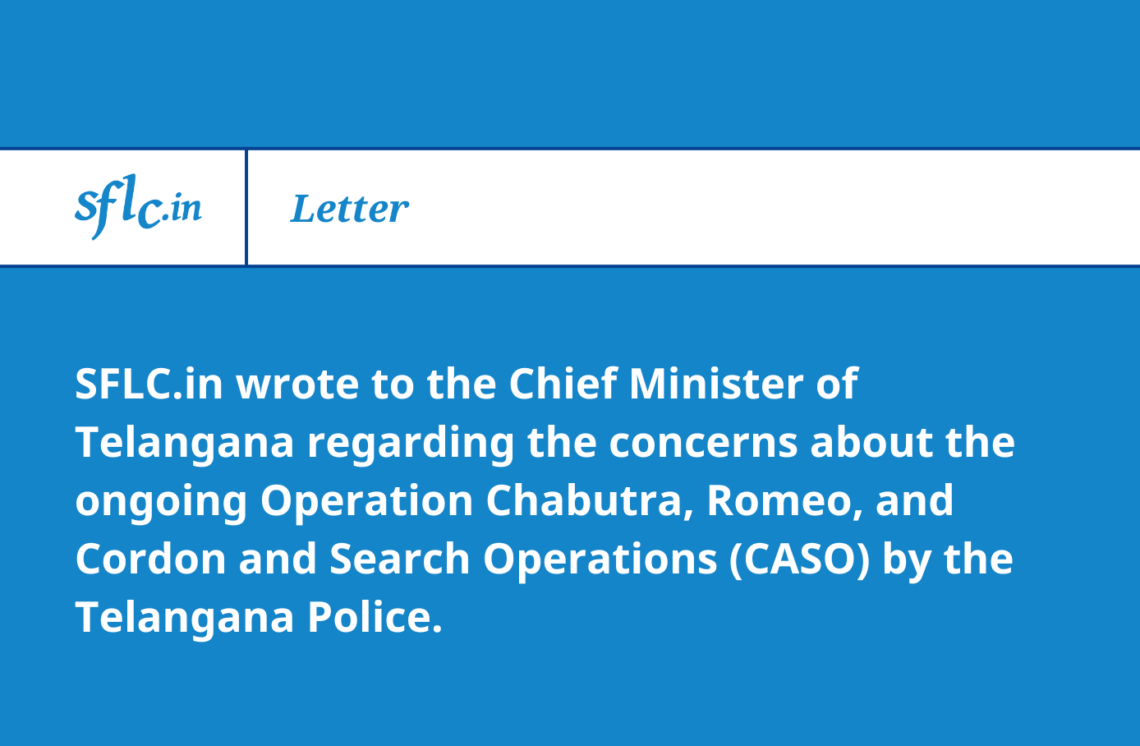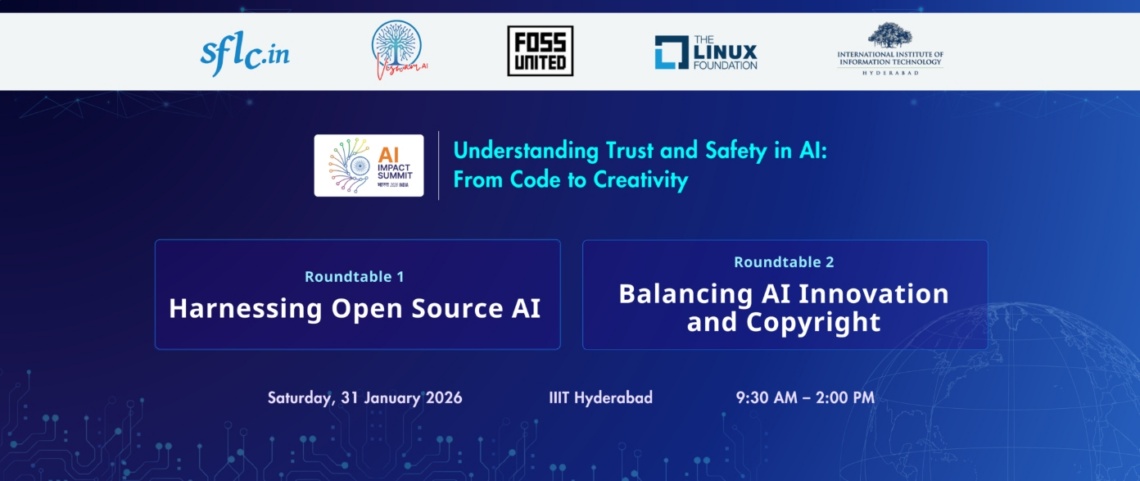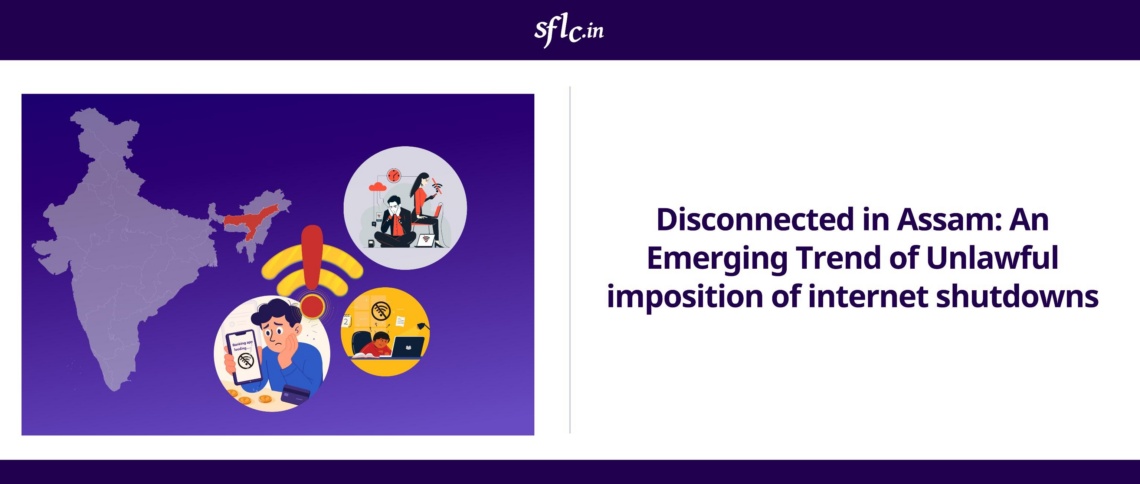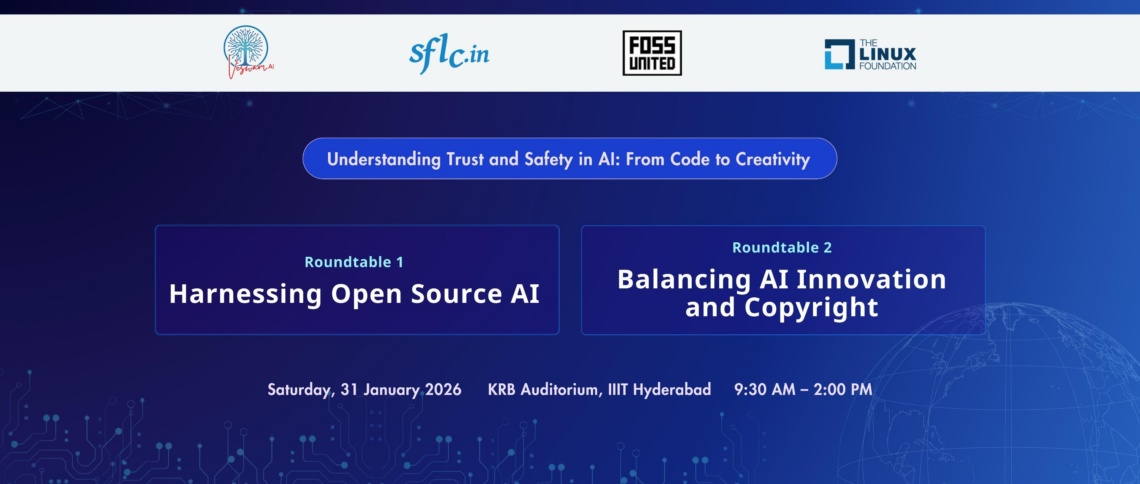Software Freedom Law Center, India (SFLC.in) recently wrote to the Chief Minister of Telangana highlighting the concerns regarding the ongoing Operation Chabutra, Romeo, and Cordon and Search Operations (CASO) by the Telangana Police.
According to media reports, these operations not only transgress legal boundaries but also constitute grave violations of fundamental human rights. The Enforcement Agencies have been using GIS Crime Mapping tools for conducting surveillance operations and training their AI. This includes collecting fingerprints, Aadhaar data, Vehicle ID, and other personal information. These operations were initiated to address concerns about underage reckless driving and late-night youth activities. However, their implementation has far exceeded their stated objectives, evolving into a tool for arbitrary detention, harassment, and surveillance.
Through the letter, we have urged the Minister to immediately halt the implementation of Operations Chabutra, Romeo, and CASO. We have also requested him to initiate a thorough investigation into the legality and conduct of these operations and review the legal basis for data collection by the police and ensure robust data protection measures. We also hope for the implementation of community-oriented policing strategies that respect Fundamental Rights and hold accountable any police officers who have violated the law or engaged in misconduct.
SFLC.in believes that a collaborative approach involving civil society organisations can lead to a more sustainable and effective public safety strategy in Telangana.
Read the letter here:
To, 20th August, 2024
Hon’ble Chief Minister
Sri Anumula Revanth Reddy
Dr. B.R. Ambedkar Telangana Secretariat
6th Floor, Hyderabad, Telangana – 500022
Subject: Urgent call for action on the operation Chabutra, Romeo, and the Cordon and Search Operations (CASO)
Respected Sir,
We write to express our profound concern regarding the ongoing implementation of Operation Chabutra, Romeo, and Cordon and Search Operations (CASO) by the Telangana Police. Over the past few years we have witnessed several news reports citing glaring issues with these operations. Based on the same, we had filed applications under the Right to Information Act, 2005; which have resulted in nothing but notifications of transfer. The facts as revealed by these media reports show that these operations not only transgress legal boundaries but also constitute grave violations of fundamental human rights. We urge your immediate intervention to cease these operations and to institute measures to prevent their recurrence.
As per news reports, Sri Satyanarayan the Deputy Commissioner (DCP) of the South Zone Hyderabad police initiated Operations Chabutra and Romeo in 2015 to address concerns about underage reckless driving and late-night youth activities. However, their implementation has far exceeded their stated objectives, evolving into a tool for arbitrary detention, harassment, and surveillance. Following the chabutra raids, the Cordon and Search Operations conducted in the recent years have far exceeded the scope and intensity of the former operations. Multiple news reports and citizens outreach have cited the excessive use of power and arbitrary breach of privacy by the enforcement agencies.
Recently, as per newspaper reports, three software engineers from Hyderabad and a cinematographer from Mumbai were allegedly harassed by the police at 1:30 am during their stay at a resort in Eegalapenta, a village in Hyderabad. Similarly, several media reports have surfaced about cops dispersing crowds and frisking individuals without due cause. There have been reports that a number of individuals who were accessing public spaces are being stopped and their biometric data recorded on the TSCOP app of Telangana Police. Such actions are in direct contravention to the Fundamental Rights to Privacy, Movement, and Assembly of the citizens of the State as enshrined under Articles 14, 19, and 21 of the Constitution of India.
Objectives of these operations
Reportedly, the Telangana Police introduced Operation Chabutra and Romeo after a boy named Nabeel was killed in the Old City in a street fight. The premise for starting these operations was the unfound conclusion by the state police that these incidents may have a connection to youngsters loitering around the streets in the night. Conducting such large scale policing operations on mere apprehension contravenes fundamental rights and is arbitrary and excessive. Furthermore, the practice of enforcement agencies on identifying the ‘suspicious’ individuals is also questionable., These suspicious individuals were classified on the basis of funky hairstyles, hats, bikes or shoes, funky shirts, tattoos, lean body type, and looking lost.
This classification is inherently problematic, as self-expression is viewed as an external manifestation of criminal tendencies. Notably, the Enforcement Agencies have been using GIS Crime Mapping tools for conducting surveillance operations and training their AI. This includes collecting fingerprints, Aadhaar data, vehicle ID, and other personal information to cross-verify with their database on a Papillon (a software used by Telangana Police to check for the individual’s criminal records and pending challans), and TSCOP (a application used by Telangana police to track suspected and missing criminals through Facial Recognition Technology). Such operations if conducted without proper safeguards could result in violation of fundamental rights of the citizens. Not only that, academic research have time and again proved that predictive policing based on surveillance and facial recognition technologies are prone to historical, representational and measurement bias, which can result in potential discrimination against people from particular class, caste, religion or sex among others.
Due to these operations, Hyderabad Police has been detaining young people and keeping them in custody – without instituting legal proceedings. Police officials scan their fingerprints to match against the police records to find any past criminal history. The Hyderabad Police have been found to detain the youth and force them to take an oath under Sections 180 and 181 of the IPC (now Sections 215 and 216 of the BNS). It is pertinent to mention that such an act is prima facie bereft of any legality. Section 180 deals with refusing to sign a statement and Section 181 deals with false statements on oath or affirmation to a public servant or person authorised to administer an oath or affirmation. Evidently, none of these sections are applicable to an issue of moral policing of youths merely exercising their right to movement and speech. This practice is deeply problematic as it involves detaining youths without legal process and coercing them into making a commitment that can later be used against them. Such tactics are essentially intimidation, rather than legitimate policing.
Furthermore, the police release these detainees before 24 hours to escape their obligation to produce them before a magistrate under Section 56, CrPC (Section 57, BNSS). The operations do not end here; they extend to counselling parents to be more cautious of their child’s activities. The police have also been accused of a full-fledged physical assault rampage against youths in the name of counselling them. In conclusion, the counselling operations being conducted by the enforcement agencies is not only illegal due to the absence of any legal foundation but is also highly excessive and arbitrary.
Fundamental Rights Violations
The core of these operations infringes upon the Fundamental Rights of citizens, as enshrined in Part III of the Constitution of India. The Constitution guarantees the right to freedom of movement and assembly, under Article 19. However, Hyderabad Police pursuing such operations results in the systematic targeting of youth for mere loitering. The imposition of arbitrary detentions, coupled with instances of physical abuse, constitutes a flagrant violation of personal liberty.
Moreover, the operations have morphed into a surveillance apparatus, with the indiscriminate collection of personal data, including fingerprints, Aadhaar details, and vehicle information. This data collection, carried out without lawful authority or transparency, constitutes a blatant breach of the right to privacy, protected under Article 21 of the Constitution. The subsequent processing of this data through AI-driven systems raises grave concerns about potential biases and discriminatory practices.
Data Profiling and Retention
The government’s aim of leveraging technology for crime management has been subverted by the misuse of data. The collection of biometric and personal data without a clear legal framework and adequate safeguards raises serious issues of data protection and privacy. The absence of transparency regarding data retention policies and the potential for misuse of this information further exacerbates these concerns. Recent data breaches within government systems underscore the urgent need for robust data security measures.
While there are already reports on the lack of transparency of data retention and processing policies for the biometric data acquired during these searches; the case becomes more serious when we pair it with the recent reports of Data Breach in the HawkEye and TSCOP App. Instances such as these and the frequency of such operations clearly violate the Fundamental Right to Privacy, Movement and Assembly of a Citizen, as rightly upheld in the cases of Kharak Singh v. State of UP, AIR 1963 SC 1295 and K.S. Puttaswamy v. Union of India, (2017) 10 SCC 1.
Cordon and Search Operations (CASO)
The Cordon and Search Operations (CASO) represent an even more egregious overreach of state power. Conducted without lawful authority and often based on mere suspicion rather than concrete evidence, these operations constitute a disproportionate and invasive intrusion into the lives of citizens. The targeting of specific communities, coupled with the potential for abuse of power by law enforcement personnel, raises serious concerns about discrimination and harassment. The legal framework governing search and seizure, outlined in the Code of Criminal Procedure (CrPC), [now Bharatiya Nagarik Suraksha Sanhita (BNSS)] has been blatantly disregarded. The issuance of blanket warrants authorising searches without specific grounds is contrary to the principles of due process. The arbitrary nature of these operations, often conducted in the dead of night, creates a climate of fear and insecurity among citizens. Historically, the Enforcement Agencies have time and again relied on Section 93 and Section 165 of the CrPC to justify these actions.
However, it is pertinent to note that warrants in both these Sections can be issued only in exceptional circumstances only for a specific address and at times, even a specified location on that address, and not for a large locality. Though the Enforcement Agencies claimed that search warrants are being procured from magistrates for each raid. However, RTI responses filed by citizens have been vague and unclear. In the year 2020, a Social Activist, Mr SQ Masood filed an RTI to find out how many CASOs the Hyderabad police had carried out since 2012. He asked for details of the number of police deployed in each CASO and the details of the cases booked in each CASO. But he was stonewalled17.
Furthermore, the CASO exercises that are conducted in other states such as Jammu and Kashmir are empowered through legislations like Armed Forces (Jammu and Kashmir) Special Powers Act, 1990, however, no such legislation is present in the State of Telangana and the State Police has to function under CrPC (now BNSS), which does not allow for such practices to be conducted. The Cordon and Search Operations have previously been in force in Jammu & Kashmir under the Armed Forces (Jammu & Kashmir) Special Powers Act, 1990, which allowed the security forces to conduct raids without a search warrant. However, the Enforcement Agencies in Telangana conduct CASO without any legislation authorising them of the same. The Hyderabad Police has been relying on the provisions of CrPC (now BNSS) to justify the Cordon and Search Operations, when in reality, neither the CrPC nor BNSS authorises a state police to conduct such operations. The police justify these operations by claiming that proper due process has been followed and search warrants are often obtained before carrying out these operations; however, the reality is on the opposite
spectrum.
Even the Office of the United Nations High Commissioner for Human Rights has termed these search and cordon operations a human rights violation. The power under these operations is solely confined to the hands of these law enforcement agencies. These warrants can purportedly be obtained by the Commissioner of Police, as under Section 20, CrPC (Section 14, BNSS), they can also be classified as the Additional District Magistrate. These warrants obtained by the Commissioner have been mechanised by the police under Section 93 of the CrPC (Section 96 of the BNSS) to carry out a cordon and search operation. The usual practice entails seeking prior written permission from the Station House Officer, highlighting the cardinal need of the operations along with the specifics. Pursuant to which, the operations are carried out under Section 94 of the CrPC (Section 97 of the BNSS), which enables the police to carry out searches in places likely to contain narcotic substances or stolen goods. However, this provision is being misused considering it only allows one to look for stolen property and not to look for property documents of vehicles, gas connections, the number of people and migrant workers residing in a house, etc.
Recommendations
In light of these serious concerns, we urge you to:
● Immediately halt the implementation of Operations Chabutra, Romeo, and CASO.
● Initiate a thorough investigation into the legality and conduct of these operations.
● Review the legal basis for data collection by the police and ensure robust data protection measures.
● Implement community-oriented policing strategies that respect Fundamental Rights.
● Hold accountable any police officers who have violated the law or engaged in misconduct.
We believe that a collaborative approach involving civil society organisations can lead to a more sustainable and effective public safety strategy in Telangana. We are confident that you share our commitment to upholding the rule of law and protecting the Fundamental Rights of all citizens. We welcome the opportunity to discuss these issues further and propose alternative solutions.
About SFLC.in
SFLC.in is a donor supported legal services organisation that brings together lawyers, policy analysts, students, and technologists to protect freedom in the digital world. SFLC.in promotes innovation and open access to knowledge by helping developers make great Free and Open SourceSoftware, protect privacy and civil liberties for citizens in the digital world by educating and providing free legal advice and help policy makers make informed and just decisions with the use and adoption of technology. SFLC.in has been granted Consultative Status with the Economic and Social Council of the United Nations (ECOSOC).
Thank you for your time and consideration.
Regards,
Prasanth Sugathan
Legal Director
SFLC.in | New Delhi
7
Copy to:
1. Commissioner of Police,
Hyderguda-Basheerbagh Rd,
Avanti Nagar, Basheer Bagh,
Hyderabad, Telangana – 500029
2. Special Chief Secretary,
Fifth Floor, A Block,
Telangana Secretariat,
Hyderabad – 500022
Phone:04023452143
Email:prl_home@telangana.gov.in




